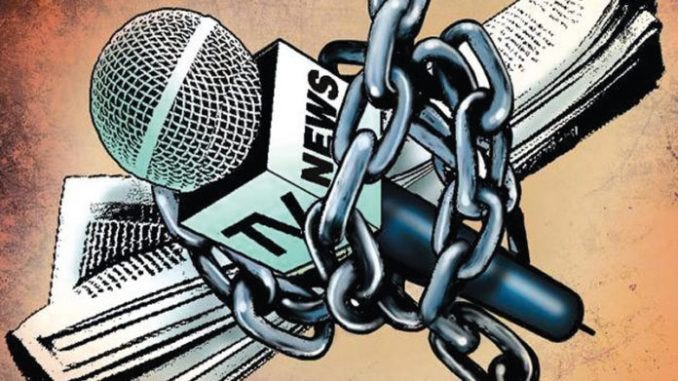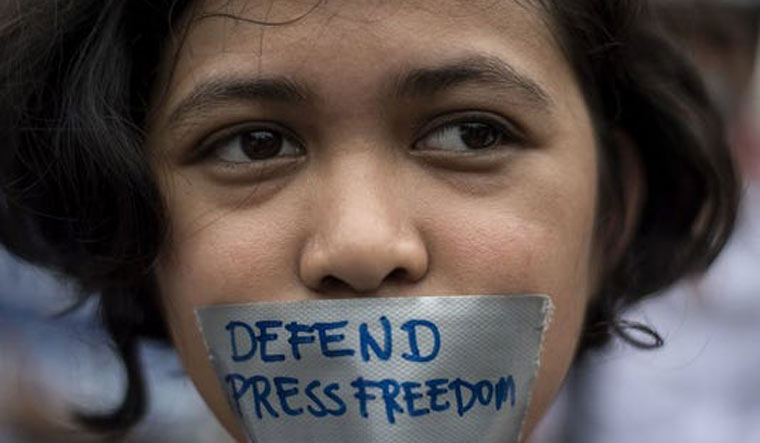India’s press freedom ranking has again fallen to 150 out of 180 countries, as per a report released by the Reporters Without Borders (RSF) that published its 2022 World Press Freedom Index on May 3. Among the neighbouring countries, Pakistan is ranked at 157, Bangladesh at 162, Sri Lanka at 146, Nepal at 76, and Bhutan at 33.
World Press Freedom Index shows the “level of freedom that journalists, news organisations and netizens have in each country and the government’s attempt to respect this freedom.” From 133 out of 180 countries in 2016 to 142 in last year’s report, India’s global press freedom has seen a continuous fall in recent years.
There have been a number of arrests and criminal cases against journalists and political activists criticising government policies. The arrest of journalists under sedition and The Unlawful Activities (Prevention) Act (UAPA) has become extremely common in democratic India.
Also read: Siddique Kappan: What Is Press Freedom In A Banana Republic?
There have been a number of arrests and criminal cases against journalists and political activists criticising government policies. The arrest of journalists under sedition and The Unlawful Activities (Prevention) Act (UAPA) has become extremely common in democratic India.
This UAPA is used by state authorities to shut down any voices against them. These kinds of arrests have become very common after the right-wing BJP came to power in 2014. As the report also mentions that under India’s PM Modi rule, “fairly progressive” media was impacted “radically,” and “Indian journalists who are too critical of the government are subjected to all-out harassment and attack campaigns by Modi devotees”.

The Hindu Mahapanchayat event in North Delhi, where several journalists were attacked by right-wing mobs, is just one of the cases of the harsh realities of press freedom in India. The journalists belonged to different publications that have been critical of the current BJP government.
Among the journalists that suffered the rage of Hindu mobs were reporters Shivangi Saxena and Ronak Bhat of the news website Newslaundry, freelance photojournalist Md Meherbaan and Arbab Ali of the news portal Article 14, and Meer Faisal of The Hindustan Gazette.
While the police have filed an FIR against the organisers of the event, it has also filed an FIR against two tweets – one by journalist Meer Faisal and another by the news portal Article 14 under Section 505 (2) of the Indian Penal Code (IPC). The two tweets which highlighted the attacks on the journalists by the Hindu mobs due to their Muslim identities; were supposedly leading to communal hatred according to the Delhi police.
Another recent arrest of three journalists in eastern Uttar Pradesh’s Ballia only shows how low government can get in restricting press freedom in the nation. The three journalists (Ajit Ojha and Digvijay Singh from Hindi daily Amar Ujala and Manoj Gupta from another Hindi newspaper) were arrested by the UP police on the alleged leak of class 12 English board examination papers. Interestingly, reports suggest that these journalists were, in fact, exposing the case of leaked question papers and have been wrongly framed.
While the Press Club of India has highly condemned the arrests, the arrested journalists have also claimed that the state authorities are eager to arrest any media persons who don’t comply with the government policies and regulations.
This is not the first case of unfair and forceful arrest of journalists, but the state of UP, led by BJP’s Yogi Adityanath, has been the epitome of similar cases. From police filing criminal charges against the local journalist Pawan Kumar Jaiswal for exposing the fraud mid-day meal scheme in government schools in UP’s Mirzapur district to the arrest of Kerala-based journalist Siddique Kappan for trying to cover the horrible Hathras rape case, the state authorities have made a complete attempt in establishing a fear amongst journalists who are even slightly critical of the government.
Media outlets whose coverage of the pandemic contradicted the official statements also came under the government’s radar to suppress their voices. Dainik Bhaskar, a widely read newspaper, became the target of tax raids after months of critical coverage of Covid-19.
Dainik Bhaskar is not the first media outlet to face the tax raids, but in 2017, NDTV’s offices were also raided. These raids on activists, journalists, and media outlets critical of the government are part of the BJP’s escalating crackdown on freedom of expression, association, and peaceful assembly since coming to power in 2014.
The RSF report also highlighted that “journalists are exposed to all kinds of physical violence including police violence, ambushes by political activists, and deadly reprisals by criminal groups or corrupt local officials.”
Kashmir has seen the worst press freedom violations by the state authorities. Especially since the BJP revoked the state’s autonomous constitutional status in 2019, the number of journalists arrested under terrorism charges has increased tremendously.
The RSF report also highlighted that “journalists are exposed to all kinds of physical violence including police violence, ambushes by political activists, and deadly reprisals by criminal groups or corrupt local officials.”
Recently, Fahad Shah, the founder, and editor of the widely read local news website The Kashmir Walla was arrested by the Pulwama district police under the anti-terror law. He was accused of spreading anti-national content on social media and glorifying terrorist activities.
This arrest came after he published a report and posted a video on social media, where he spoke to the family of a teenage boy killed along with three other militants. The police claimed that the teenager was a “hybrid militant,” even as the family requested the dead body of their son. Previously, the police have also arrested another journalist Sajad Gul from the same publication under the anti-terrorism charges.
There have been numerous journalist arrests in Kashmir, where these media persons have faced raids, and interrogations for their reporting or have been put on the no-fly list. Even after so many reports of journalists being treated this way for their reporting, the government seems to have denied the credibility of the report last year.

The RSF report specified that Press freedom is in “crisis” in India, with “violence against journalists, the politically partisan media and the concentration of media ownership.” The government’s denial or no acknowledgement only leads to them having more norms to restrict any critical voices in the country.
In a democratic and developing nation like India, one can at least expect to do factual reporting without having to worry about their families and their lives. It’s a shame to see India’s press freedom going backwards.
The report has not only highlighted how press freedom has drastically decreased in the last few years, but it also shows us how worrisome the current state of journalism is. The least we can do is be open to the current government’s criticism and support the journalists risking their lives to report on issues important to the nation.
Freedom of speech shouldn’t be a crime in any country, let alone be in the world’s largest democracy India.
Featured image source: AFP News Agency
About the author(s)
Pragati Parihar is a masters student, studying International Relations at University College Dublin, Ireland, and is highly interested in topics such as feminism, gender based violence, and gender representation in politics. Also a travel enthusiast and an avid reader of mythology!




